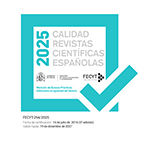Being and Time: Max Frisch’s Homo faber
Resumen
Time plays a central role in Max Frisch’s Homo faber. Reading the autobiographic entries that comprise the novel necessitates navigating a convoluted temporal structure. In addition, the literary and cinematographic representations, which Walter Faber, the technocratic hero of the novel, obsessively produces, constitute an attempt to arrest the passage of time in the mechanically-produced image and word. Allusions to the Biblical «Garden of Eden», the Oedipus myth, and classical art and antiquity further complicate the temporal structure of the novel. Most importantly, the novel suggests that Faber is actually incapable of understanding life or death because he lacks an authentic relationship to time. This becomes significant because Faber pens the narrative of the novel from the hospital room in which in he awaits news of his impending death. Therein lies the problem: How can a man with no relationship to time face his own mortality? The answer offered here is that Faber must give birth to himself as a human being in time. The following essay addresses this possibility by focusing on two complexes of «falls» (i. e., «Zufall» «Fall» and «Unfall»), which begin and end the «First Station» of the novel. The first complex throws Faber into a primeval, conflated, «Eden-like» temporality; the second complex features Faber’s «fall» from this original (pre)temporality into the discrete, limited, linear temporality characteristic of human experience. Thus, in the «Second Station» of the novel, Faber emerges as a human, senscient being able to face the inevitability of his death and the reality of his life in time.Descargas
Descarga artículo
Licencia
La Revista de Filología Alemana, para fomentar el intercambio global del conocimiento, facilita el acceso sin restricciones a sus contenidos desde el momento de su publicación en la presente edición electrónica, y por eso es una revista de acceso abierto. Los originales publicados en esta revista son propiedad de la Universidad Complutense de Madrid y es obligatorio citar su procedencia en cualquier reproducción total o parcial. Todos los contenidos se distribuyen bajo una licencia de uso y distribución Creative Commons Reconocimiento 4.0 (CC BY 4.0). Esta circunstancia ha de hacerse constar expresamente de esta forma cuando sea necesario. Puede consultar la versión informativa y el texto legal de la licencia.










